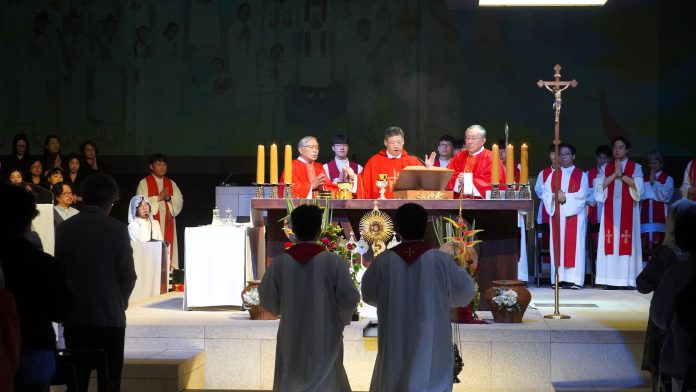Catholics gathered at Seosomun Shrine on May 29 for a memorial Mass honoring Blessed Paul Yun Ji-chung and his companion martyrs, whose deaths laid the foundations of the Korean Church.
The liturgy, held at the Seosomun Shrine History Museum, was led by Archbishop Peter Soon-taick Chung of Seoul and concelebrated by Cardinal Andrew Soo-jung Yeom, retired prelate of Seoul, and Auxiliary Bishop Job Yo-bi Koo, along with dozens of priests from the archdiocese.
Also present were descendants of the Servants of God Kwon Il-shin and Yi Seung-hun, two key figures in early Korean Catholicism.
Their participation served as a symbolic link between the Church’s founding generation and the present-day faithful.
In his homily, Archbishop Chung highlighted the deep spiritual significance of the site, where a large number of Catholic martyrs were executed during the Joseon Dynasty’s anti-Christian persecutions.
“This sacred ground is soaked in the blood of those who bore witness to their love for God through martyrdom,” he said.
Between 1801 and 1866, Seosomun served as an official execution ground. Of the 103 Korean saints canonized by the Vatican, 44 were martyred at this site, along with 27 of the 124 beatified.
“This site is not only hallowed by the blood of the martyrs,” the archbishop said. “It has also become the seedbed of the Korean Church. The sacrifice of these witnesses laid the foundations upon which our community of faith now stands.”
This year marks the 11th anniversary of the beatification of Paul Yun Ji-chung and 123 companions by Pope Francis during his apostolic visit to Korea in 2014.
Reflecting on their legacy, Archbishop Chung said: “Their lives are no longer confined to history. Their faith remains a living model, a compass that still guides us today.”
He quoted Pope Francis’ words during the 2014 beatification Mass: “They were prepared to make great sacrifices and renounce everything that might separate them from Christ, for they knew that He alone was their true treasure.”
“The example of the martyrs calls each of us to reject worldly temptations and to bear witness to God’s love through authentic Christian living,” Archbishop Chung continued. “In their charity and solidarity, they have entrusted to us a mission—one that demands our love for neighbor and our dedication to justice and reconciliation.”
Drawing from the day’s Gospel reading, the archbishop likened the martyrs to the grain of wheat that dies to bear fruit. “Unless a grain of wheat falls to the ground and dies, it remains alone; but if it dies, it bears much fruit,” he said.
“Today, we do not merely remember the martyrs—we recommit ourselves to the fidelity they exemplified,” he added. “Their witness challenges us to ask: Do I truly rely on and trust in God alone? Can I proclaim, with conviction, that ‘nothing can separate us from the love of Christ’?”
Archbishop Chung concluded by emphasizing that the ultimate legacy of the martyrs is a legacy of hope.
“The courage, conviction, and unwavering love they demonstrated must serve as a guiding light for our present and for generations to come. May the intercession of the Blessed Virgin Mary help us to root this faith deeply within us and to bear abundant fruit as heirs to their victorious witness.”









